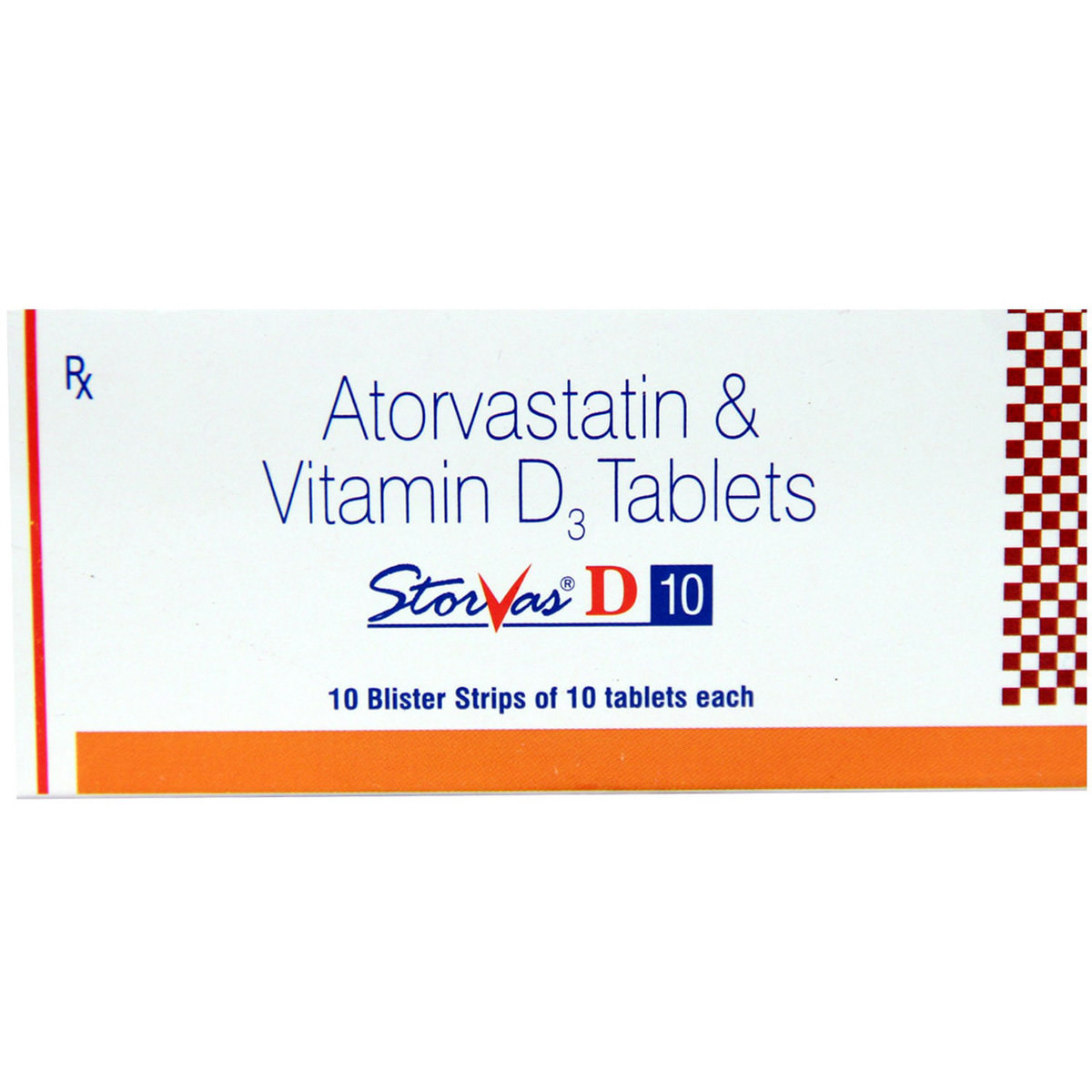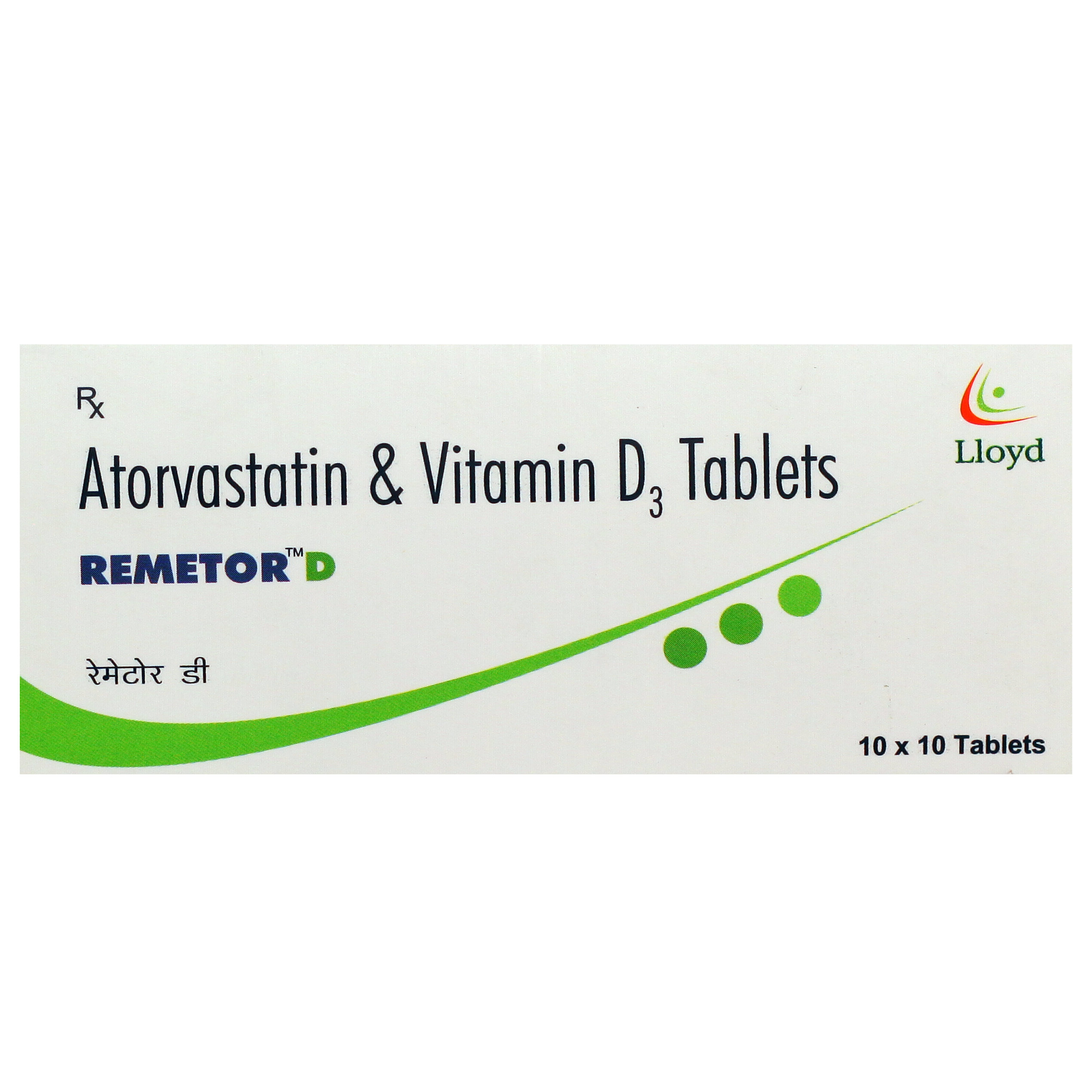ATOREC D3 TABLET
MRP ₹388.7
(Inclusive of all Taxes)
₹58.3 Cashback (15%)
Provide Delivery Location

secured payment

india's most trusted pharmacy

genuine products
Composition :
Manufacturer/Marketer :
Consume Type :
Expires on or after :
Return Policy :
About ATOREC D3 TABLET
ATOREC D3 TABLET is a cholesterol-lowering medicine containing atorvastatin (statins or lipid reducer) and cholecalciferol (Vitamin D3). It helps lower bad cholesterol (low-density lipoprotein-LDL) and triglycerides (fats) levels. Hence, it reduces the risk of heart attack and stroke in the future. Two types of cholesterol are found in our body: good cholesterol (high-density lipoprotein) and bad cholesterol (low-density lipoprotein). Good cholesterol is good for our heart and helps reduce the bad cholesterol in our body. On the other hand, excess bad cholesterol (LDL) leads to the risk of heart diseases like heart attack and stroke.
ATOREC D3 TABLET works by blocking liver enzymes, causing the liver to make less cholesterol. So, ATOREC D3 TABLET increases the uptake and breakdown by the liver of cholesterol already in the blood. Thus, ATOREC D3 TABLET lowers the levels of lipids known as cholesterol and triglycerides in the blood when lifestyle changes (like a low-fat diet) on their own have failed. ATOREC D3 TABLET reduces the ‘bad’ cholesterol and increases the ‘good’ cholesterol by blocking our body’s production of ‘bad’ cholesterol. It also improves your body’s ability to remove it from your blood. Cholecalciferol is added to relieve the muscle pain caused due to atorvastatin. Collectively, ATOREC D3 TABLET helps reduce cholesterol levels in the blood.
The prescribed dose of ATOREC D3 TABLET is daily once a day at the same time. Your doctor will advise you on how often you take your tablets based on your medical condition. You can take ATOREC D3 TABLET with food or without food. It should be swallowed whole with a glass of water. Do not chew, bite, or break it. In a few cases, you may experience allergic reactions, headache, blurred vision, pain, constipation, nausea, diarrhoea, muscle spasms, joint swelling, and back pain. Most of these side effects of ATOREC D3 TABLET do not require medical attention and gradually resolve over time.
ATOREC D3 TABLET may cause a breakdown of skeletal muscle tissue, leading to kidney failure. This condition usually occurs in the elderly, people with kidney disease, and poorly controlled hypothyroidism (underactive thyroid). ATOREC D3 TABLET should not be prescribed to children less than ten years of age. You should contact a doctor before if you have had an allergic reaction to ATOREC D3 TABLET, have liver or kidney problems, pregnant or planning to get pregnant, are breastfeeding, have severe lung disease, have a previous heart attack or stroke caused by bleeding in the brain, have hypothyroidism, drink more than two servings of alcohol per day and have a muscle disorder (fibromyalgia). The efficiency of ATOREC D3 TABLET can be increased by taking low-fat or cholesterol-containing food and drinks.
Uses of ATOREC D3 TABLET

Have a query?
Directions for Use
Key Benefits
ATOREC D3 TABLET contains Atorvastatin (fat or lipid reducer) and Cholecalciferol (Vitamin D3). Atorvastatin works by blocking liver enzymes, causing the liver to make less cholesterol. So, ATOREC D3 TABLET increases the uptake and breakdown by the liver of cholesterol already in the blood. Thus, ATOREC D3 TABLET lowers the levels of lipids known as cholesterol and triglycerides in the blood when lifestyle changes (like a low-fat diet) on their own have failed. ATOREC D3 TABLET reduces the ‘bad’ cholesterol and increases the ‘good’ cholesterol by blocking our body’s production of ‘bad’ cholesterol. It also improves your body’s ability to remove it from your blood. Cholecalciferol or Vitamin D3 is added to get relief from the musculoskeletal pain caused due to atorvastatin. Collectively, ATOREC D3 TABLET helps reduce the raised cholesterol level in the bloodstream.
Storage
Drug Warnings
ATOREC D3 TABLET may cause serious muscle problems (myopathy and rhabdomyolysis) and can lead to kidney failure. This condition usually occurs in the elderly, people with kidney disease, and poorly controlled hypothyroidism (underactive thyroid). ATOREC D3 TABLET should not be prescribed to children less than ten years of age. You should contact a doctor before if you have had an allergic reaction to ATOREC D3 TABLET, have a liver problem (jaundice, liver cirrhosis), or kidney problems, are pregnant or planning to get pregnancy, are breastfeeding, have severe lung disease, have a previous heart attack or stroke caused by bleeding in the brain, have hypothyroidism, drink more than two servings of alcohol per day and have a muscle disorder (fibromyalgia) and damaged muscle tissue (rhabdomyolysis). Also, calcium levels can decrease in blood, so intake calcium supplements to avoid unpleasant side effects.
Diet & Lifestyle Advise
- Try aromatherapy, yoga, and meditation to help relax your body and mind.
- Try to do breathing exercises to get more oxygen.
- Eat a healthy diet rich in soluble fibre like beans, legumes, whole grain, flax, apples, and citrus fruits.
- Try to replace most of your saturated fats with unsaturated fats that can reduce total cholesterol and LDL cholesterol quickly. Foods like avocados, olive oil, fatty fish, and nuts contain many heart-healthy unsaturated fats, so eating them regularly is beneficial.
- Try to adopt a Mediterranean-style diet rich in olive oil, fruits, vegetables, nuts, whole grains, and fish, low in red meat and most dairy.
- Try to give priority to more fruits and veggies in your daily meal as these contain antioxidants which help to lower LDL
- Minimize the intake of added sugar. The American Heart Association (ADA) recommends that one should not eat more than 100 calories (25 grams) of added sugar for women and children and no more than 150 calories (37.5 grams) for men every day.
- American Heart Association recommends that sodium chloride (table salt) intake should not exceed more than 2,300 mg per day as part of a healthy eating pattern.
- As a precautionary measure, do not consume alcohol and quit smoking.
Habit Forming
Therapeutic Class
All Substitutes & Brand Comparisons
RX
Out of StockASTIN D 10MG TABLET
Micro Labs Ltd
₹130
(₹11.44 per unit)
67% CHEAPERRX
Storvas D 10 Tablet 10's
Sun Pharmaceutical Industries Ltd
₹131.5
(₹11.84 per unit)
66% CHEAPERRX
Remetor D Tablet 10's
Lloyd Healthcare Pvt Ltd
₹135.5
(₹12.2 per unit)
65% CHEAPER
Alcohol
Safe if prescribed
Do not drink too much while taking this medicine. Drinking a lot of alcohol will make you more likely to get muscle problems (like myopathy and rhabdomyolysis) and liver problems (with side effects like yellowing of eye/skin and urine).
Pregnancy
Consult your doctor
ATOREC D3 TABLET is pregnancy category X medicine. So it can cause damage to the fetus or unborn baby. Hence, ATOREC D3 TABLET is not recommended during pregnancy. Contact your doctor before taking ATOREC D3 TABLET.
Breast Feeding
Consult your doctor
ATOREC D3 TABLET can pass into your breast milk and may harm your baby. So, before using ATOREC D3 TABLET, consult a doctor.
Driving
Safe if prescribed
ATOREC D3 TABLET has no or negligible influence on the ability to drive and use machines.
Liver
Consult your doctor
ATOREC D3 TABLET to be taken with caution, especially if you have a history of Liver diseases/conditions. The dose may have to be adjusted by your doctor.
Kidney
Consult your doctor
ATOREC D3 TABLET to be taken with caution, especially if you have a history of Kidney diseases/conditions. The dose may have to be adjusted by your doctor.
Children
Safe if prescribed
ATOREC D3 TABLET is not indicated in the treatment of patients below the age of 10 years.
FAQs
There's no strong evidence to suggest that taking ATOREC D3 TABLET will reduce fertility in either men or women. However, it is advisable to consult a doctor before taking it if you're likely to get pregnant or pregnant.
Increase your daily diet with fiber, fruits, vegetables, whole grains, and fish, and cut saturated fat as well. Stop smoking and drinking and try to work out every day as well.
No, you should not stop taking ATOREC D3 TABLET without consulting your doctor. Please take advice from the doctor before quitting.
People affected with hypothyroidism (underactive thyroid), muscle weakness, joint pain, kidney disease, diabetes, liver disease, uncontrolled epilepsy, high or low potassium level, or severely low blood pressure.
There is no firm clinical evidence stating that an intake of ATOREC D3 TABLET causes harm to the baby. However, ATOREC D3 TABLET passes into the breast milk and may harm the baby. It is advisable to consult a doctor if you are a nursing mother and taking ATOREC D3 TABLET.
Yogurt is a probiotic which can help in lowering the raised cholesterol level if taken with ATOREC D3 TABLET. Yogurt eaters have a better metabolic profile than those who didn't eat yogurt.
Egg yolks (yellow part of the egg) are high in cholesterol and rich in saturated fatty acids with a greater effect on our blood cholesterol levels. However, you can take a minimum of 3 whole eggs per day as eggs are considered a good source of HDL (good cholesterol). If you have high cholesterol, please consult a doctor regarding intake of the yolk part of the egg.
Country of origin
Manufacturer/Marketer address







